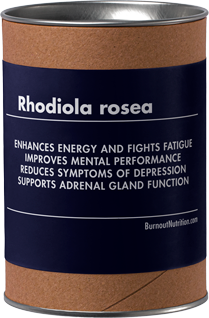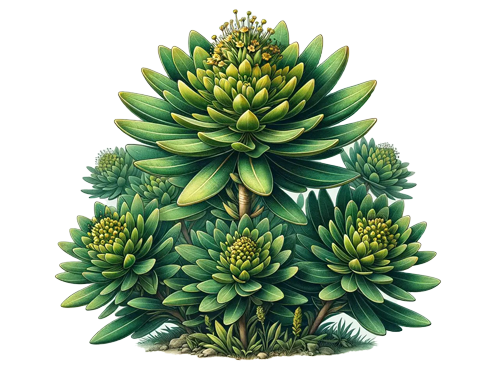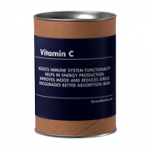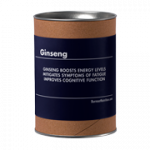Rhodiola rosea is a plant that is native to the arctic regions of Europe and Asia. It is known for its adaptogenic properties, meaning it can help the body adapt to stress, which can be beneficial for people with chronic fatigue syndrome.
It is believed that Rhodiola rosea can enhance energy metabolism and increase the capacity of the body to perform mentally and physically. It can potentially reduce mental and physical fatigue, improve cognitive functions, and stimulate the nervous system, thus helping people fight the tiredness and lack of energy associated with chronic fatigue syndrome.
However, while some studies suggest that this herb can be beneficial for people with chronic fatigue syndrome, it’s important to remember that individual responses may vary and what works for one person may not work for another. Furthermore, since chronic fatigue syndrome is a complex illness with multiple symptoms, it may be necessary to combine Rhodiola rosea with other treatments to achieve the best results. Therefore, it’s always recommended to talk to a healthcare provider before starting any new supplements or treatments.

- Enhances energy and fights fatigue
- Improves mental performance and alertness
- Reduces symptoms of depression
- Supports adrenal gland function
- Modulates stress response effectively
Rhodiola rosea: Purchase | Dosage | Benefits | Science
Buy Rhodiola rosea online:
Important Note: This information serves as a guideline only and should NOT replace specialist advice. Always consult your doctor, pharmacist or a health care professional like a nutritionist before starting any new treatment.
Rhodiola rosea Dosage for Chronic Fatigue
While the specific dosage for Rhodiola rosea in treating chronic fatigue syndrome may vary based on several factors like age, health status, and individual tolerance, here are some general guidelines based on commonly recommended dosages:
- For adults aged 18-60, a typical oral dose is 200-600 mg daily. This dose is often divided into two or three doses throughout the day.
- It’s recommended to start with a lower dose (like 100-200 mg daily) to see how your body reacts, then gradually increase if necessary.
- No specific dosages are recommended for individuals under 18 or over 60 as the safety and efficacy in these age groups haven’t been firmly established.
- Both men and women can follow the same dosage recommendations, but women who are pregnant or breastfeeding should avoid Rhodiola rosea unless directed otherwise by a healthcare provider.
Please always consult with a healthcare provider before starting any new supplement regimen.
Rhodiola rosea Benefits for Chronic Fatigue
- Improves physical and mental energy.
- Regulates stress hormone levels.
- Boosts brain function and focus.
- Increases body’s resistance to stress.
- Enhances immune system function.
1. Boosts Energy: Rhodiola rosea is known for enhancing energy levels. It does this by increasing the red blood cell count, which helps to transport oxygen throughout the body, hence reducing fatigue.
2. Improves Mental Function: Chronic Fatigue Syndrome often comes with cognitive issues like forgetfulness and brain fog. Rhodiola rosea can aid in improving mental function and concentration.
3. Helps with Stress Management: The herb has adaptive qualities which makes it beneficial for those suffering from stress-related burnouts, a common issue in people with chronic fatigue syndrome.
4. Enhances Mood: Rhodiola rosea has been shown to improve mood by balancing neurotransmitters in the brain, which may help alleviate feelings of depression often experienced by those with chronic fatigue syndrome.
5. Boosts Immune System: Chronic fatigue syndrome often weakens the immune system. Rhodiola rosea includes antimicrobial and antioxidant properties that can help bolster the immune system and enhance resilience to illnesses.
Science on Rhodiola and Burnout recovery
Rhodiola rosea in Subjects with Prolonged or Chronic Fatigue Symptoms: Results of an Open-Label Clinical Trial | ⏍
This open-label clinical trial explored the use of Rhodiola rosea (WS® 1375) in 100 subjects with prolonged or chronic fatigue, reporting significant improvement in fatigue symptoms over 8 weeks with favorable safety assessments.
Evidence-based efficacy of adaptogens in fatigue, and molecular mechanisms related to their stress-protective activity | ⏍
This review assesses the scientific evidence for adaptogens, including Rhodiola rosea, in treating fatigue. It provides a detailed examination of the molecular mechanisms behind their stress-protective effects, particularly in improving cognitive function and mental performance in fatigue and chronic fatigue syndrome.
Rhodiola rosea for physical and mental fatigue: a systematic review | ⏍
This systematic review covers 11 studies on Rhodiola rosea’s effects on physical and mental fatigue. It highlights the variability in study outcomes and methodologies, indicating the need for more uniform measurement approaches in future research on this topic.
What is Rhodiola rosea?
Rhodiola rosea, also known as arctic root or golden root, is a plant that grows naturally in the wild, cold regions of the world. These include much of the Arctic, the mountains of Central Asia, the Rocky mountains, and mountainous parts of Europe, such as the Alps, Pyrenees, Carpathian Mountains, Scandinavia, Iceland, Great Britain and Ireland. It is commonly consumed as a supplement or tea.

Our favourite Rhodiola rosea brand
We recommend Pure Encapsulations brand Rhodiola rosea, (unless you can find a good source of an organic Rhodiola, e.g. Fushi), because it’s:
- Reliably high quality
- Readily available
- Well reviewed
Organic Rhodiola rosea options
There are organic versions of Rhodiola supplements, (notably by great brands such as Fushi), but we’ve found that the supply can be inconsistent and often you cannot get them when you need them.
Vegan Rhodiola rosea options
All Rhoriola supplements should be vegan by definition, as it’s just a dried wild plant; but always check the label!





